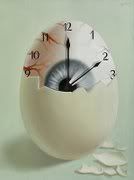William Willett (August 10, 1856 – March 4, 1915), is the inventor of daylight-saving time.
Willett was born in Farnham, Surrey, in the United Kingdom, and educated at Marylebone Grammar School. After some commercial experience, he entered his father's building business, Willett Building Services. Between them they created a reputation for 'Willett built' quality houses in choice parts of London and the south, notably in Chelsea. He lived most of his life in Chislehurst, Kent, where, it is said, after riding his horse in Petts Wood near his home early one summer morning and noticing how many blinds were still down, the idea for daylight-saving time first occurred to him.
This was not the first time that the idea of adapting to daylight hours had been mooted, however. Benjamin Franklin had done so in 1784 in a light-hearted letter published in the Journal of Paris [1]. Although Franklin's facetious suggestion was simply that people should get up earlier in summer, he is usually attributed as the inventor of DST while Willett is often ignored.
Using his own financial resources, in 1907 William published a pamphlet The Waste of Daylight [2]. In it he proposed that the clocks should be advanced by 80 minutes in the summer. The evenings would then remain light for longer, increasing daylight recreation time and also saving 2.5 million pounds in lighting costs. He suggested that the clocks should be advanced by 20 minutes at a time at 2 am on successive Sundays in April and be retarded by the same amount on Sundays in September.
Through vigorous campaigning by 1908 Willett had managed to gain the support of an MP, Robert Pearce, who made several unsuccessful attempts to get it passed into law. A young Winston Churchill also promoted it for a time (see "A Silent Toast to William Willett" by Winston S. Churchill, Pictorial Weekly, 1934)[3], and the idea was examined again by a parliamentary select committee in 1909 but again nothing was done. The outbreak of the First World War made the issue more important primarily because of the need to save coal. Germany had already introduced the scheme when the bill was finally passed in Britain on May 17, 1916 and the clocks were advanced by an hour on the following Sunday, May 21 — enacted as a wartime production-boosting device under the Defence of the Realm Act. It was subsequently adopted in many other countries.
William Willett did not live to see daylight-saving become law, as he died of influenza in 1915 at the age of 58. He is commemorated in Petts Wood by a memorial sundial, set permanently to Daylight-Saving Time. The Daylight Inn in Petts Wood is also named in his honour. His house in the London Borough of Bromley is marked with a blue plaque. Willett's great-great-grandson is musician Chris Martin, of the band Coldplay. Incidentally, one of the band's most famous songs is called Clocks.












0 comments:
Post a Comment